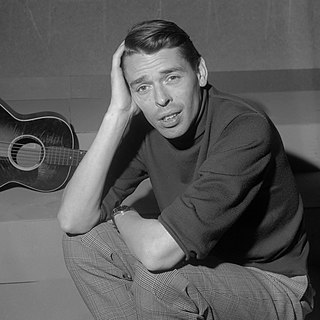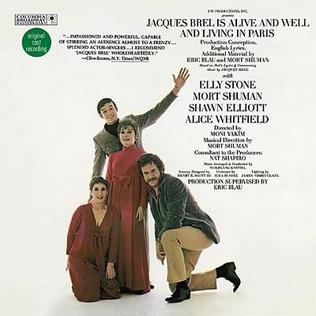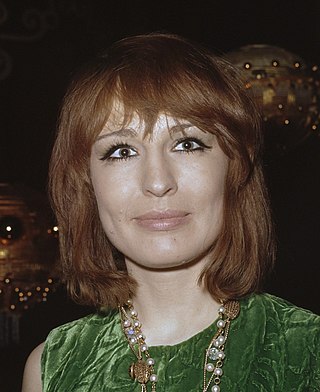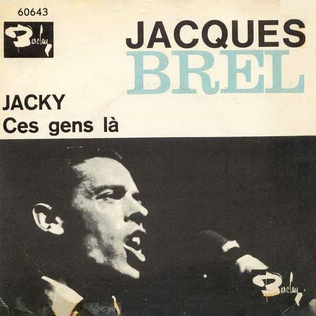
Jacques Romain Georges Brel was a Belgian singer and actor who composed and performed theatrical songs. He generated a large, devoted following—initially in Belgium and France, but later throughout the world. He is considered a master of the modern chanson.

Seasons in the Sun is an English-language adaptation of the 1961 Belgian song Le Moribond by singer-songwriter Jacques Brel, with lyrics rewritten in 1963 by singer-poet Rod McKuen, depicting a dying man's farewell to his loved ones. It became a worldwide hit in 1974 for singer Terry Jacks and reached Christmas number one in the UK in 1999 for Westlife.

Bobbejaan Schoepen was a Flemish pioneer in Belgian pop music, vaudeville, and European country music. Schoepen was a versatile entertainer, entrepreneur, singer-songwriter, guitarist, comedian, actor, and professional whistler, as well as the founder and former director of the amusement park Bobbejaanland. His musical career flourished from 1948 until the first half of the 1970s. He sold more than five million copies from his repertoire of 482 songs, which extended from Twang, cabaret, instrumental film music, chansons, country, to folk and vocal music. Born in Boom, Antwerp, Flanders, Belgium, he worked his way up from a working-class environment to become one of the 200 richest people in Belgium.

Monique Andrée Serf, known as Barbara, was a French singer. She took her stage name from her grandmother, Varvara Brodsky, a native of Odesa, Ukraine. Barbara became a famous cabaretière in the late 1950s in Paris, known as La Chanteuse de minuit, before she started composing her own tracks, which brought her to fame. Her most famous songs include "Dis, quand reviendras-tu ?" (1962), "Ma plus belle histoire d'amour" (1966) and "L'Aigle noir" (1970), the latter of which sold over 1 million copies in just twelve hours.

Mortimer Shuman was an American singer, pianist and songwriter, best known as co-writer of many 1960s rock and roll hits, including "Viva Las Vegas". He also wrote and sang many songs in French, such as "Le Lac Majeur", "Papa-Tango-Charly", "Sha Mi Sha", "Un Été de Porcelaine", and "Brooklyn by the Sea" which became hits in France and several other European countries.

Johan Anthierens was a Belgian journalist, columnist, publicist, critic and writer. He became notorious because of his socially conscious columns, as well as his equally controversial opinions during interviews. He published both in HUMO as well as Knack and founded his own short-lived satirical magazine, De Zwijger in 1982-1985. The general public got to know him thanks to his television appearances, both as panel member in the quiz De Wies Andersen Show and as interviewer in the talkshow Noord-Zuid (North-South). Due to his confrontational criticism of capitalism, the monarchy, the Church, the establishment and the far-right movement Anthierens had both a lot of admirers as well as many enemies. Still, together with Louis De Lentdecker and Maurice De Wilde, he was widely regarded as one of the "Big Three" of Flemish critical journalism.
"If You Go Away" is Rod McKuen's English-language version of the 1959 Jacques Brel song "Ne me quitte pas". Created as part of a larger project to bring Brel's work into English, "If You Go Away" is considered a pop standard and has been recorded by many artists, including Greta Keller, for whom some say McKuen wrote the English lyrics.

"Amsterdam" is a song by Jacques Brel. It combines a powerful melancholic crescendo with a rich poetic account of the exploits of sailors on shore leave in Amsterdam. Musically, it takes its base melody line from the melody of the English folk song Greensleeves.

"Le Plat Pays" is a French-language song by Belgian singer Jacques Brel about his home country. It also exists in a Dutch-language version as "Mijn vlakke land", also performed by him. The French lyrics are by Jacques Brel, the Dutch lyrics by Ernst van Altena.

Jacques Brel Is Alive and Well and Living in Paris is a musical revue of the songs of Jacques Brel. Brel's songs were translated into English by Eric Blau and Mort Shuman, who also provided the story. The original 1968 Off-Broadway production ran for four years and spawned international and regional productions, as well as a West End production and Off-Broadway revival, among others. A film adaptation was released in 1975.
Marieke, also spelled Marike, is a Dutch-language feminine given name, a diminutive of Maria. The Polish, Greek and Japanese equivalent is Marika.

"Ces gens-là" is a French language song by the late Belgian singer Jacques Brel, published in 1966 by the Éditions Pouchenel of Brussels, about the despair of a hopeless love. The title, meaning "those people", or, "those folks", has also been translated as "that lot there".

"Ne me quitte pas" is a 1959 song by Belgian singer-songwriter Jacques Brel. It has been covered in the original French by many artists and has also been translated into and performed in many other languages. A well-known adaptation, with English lyrics by Rod McKuen, is "If You Go Away".

Elisabeth Dorathea "Liesbeth" List was a Dutch singer. She became popular during the 1960s and frequently collaborated with Ramses Shaffy. She also sang Jacques Brel's chansons in Dutch translation.

Jacques Brel Is Alive and Well and Living in Paris is a 1975 French/Canadian musical film directed by Denis Héroux. The screenplay by Eric Blau is an adaptation of his book for the long-running off-Broadway revue of the same name. The score is composed of songs with music by Jacques Brel and his accompanist Gérard Jouannest and English translations of the original French lyrics by Blau and Mort Shuman.

Lisa del Bo is a Belgian singer who is popular in her own country and also in Germany. Lisa del Bo is a Flemish singer who often sings in the Dutch language but has been known to record songs in other languages as well.

"Jacky" (La chanson de Jacky) is a song written by the Belgian singer-songwriter Jacques Brel and Gérard Jouannest. Brel recorded the song on 2 November 1965, and it was released on his 1966 album Ces gens-là. The song was translated from French into English and retitled "Jackie".

Boîte à bonbons is a 16-CD box set compilation of the recorded songs of Jacques Brel. The limited edition box set was released to mark the 25th anniversary of Jacques Brel's death. The box set includes 15 albums remastered from the original records. CD digipacks are presented in their original sleeve with lyrics. The box set also includes an illustrated booklet with various pictures, a biography, and Brel's citations and testimonies. Also included are five never before released songs from the recording sessions of the album Les Marquises. Included with the booklet is a bonus CD containing 28 titles: 26 songs from Radio Hasselt recorded 14 and 21 August 1953, a recording from the Brel family's private collection, and a 1962 recording from the Dutch television show AVRO. The box set is also available in an alternate velvet box format with CDs in crystal cases.

Mathilde is a song by Jacques Brel with music by Gérard Jouannest. It was one of the five tracks appearing on the B-side of his eighth album, Ces gens-là, released in 1966 on a 10-inch record

















